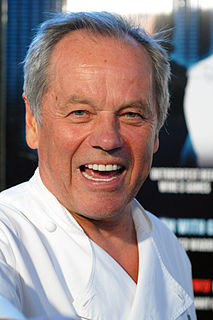A Quote by Herbert Spencer
There is a story of some mountains of salt in Cumana, which never diminished, though carried away in much abundance by merchants; but when once they were monopolized to the benefit of a private purse, then the salt decreased; till afterward all were allowed to take of it, when it had a new access and increase. The truth of this story may be uncertain, but the application is true; he that envies others the use of his gifts decays then, but he thrives most that is most diffusive.
Related Quotes
Gandhi was only minding his own business when he took a walk to get some salt and ended up overthrowing the British Empire. You can't set out to overthrow an empire, but if you have to get some salt then get some salt. If you have to write some independent songs that are honest, just write them. If you have to do a day job stacking shelves, so be it.
Salt is a powerful symbol in Haiti, as elsewhere. Salt of the earth, for example is an American phrase. In Haiti, myth and legend has it that if you are turned into a zombie, if someone gives you a taste of salt, then you can come back to life. And in the life of the fishermen, there are so many little things about salt that I wanted to incorporate. The salt in the air. The crackling of salt in the fire. There's all this damage, this peeling of the fishing boats from the sea salt. But there is also healing from it, sea baths that are supposed to heal all kinds of aches and wounds.
The famous Zen parable about the master for whom, before his studies, mountains were only mountains, but during his studies mountains were no longer mountains, and afterward mountains were again mountains could be interpreted as an alleory about [the perpetual paradox that when one is closest to a destination one is also the farthest).
This is a world that is much more uncertain than the past. In the past we were certain, we were certain it was us versus the Russians in the past. We were certain, and therefore we had huge nuclear arsenals aimed at each other to keep the peace. That's what we were certain of... You see, even though it's an uncertain world, we're certain of some things. We're certain that even though the "evil empire" may have passed, evil still remains.
We live on the flat, on the level, and yet - and so - we aspire. Groundlings, we can sometimes reach as far as the gods. Some soar with art, others with religion; most with love. But when we soar, we can also crash. There are few soft landings. We may find ourselves bouncing across the ground with leg-fracting force, dragged towards some foreign railway line. Every love story is a potential grief story. If not at first, then later. If not for one, then for the other. Sometimes, for both.
What I often do in my work is to take a great story, such as the Odyssey, the search for the Grail, the story of Jesus, or the story of the great peacemaker who helped create the Iroquois Confederacy in the 15th century. I then use these tales as templates upon which to weave psychological and spiritual exercises which allow us to open ourselves up to the larger venue of a story.
You can tell a true war story by the questions you ask. Somebody tells a story, let's say, and afterward you ask, 'Is it true?' and if the answer matters, you've got your answer . . . Absolute occurrence is irrelevant. A thing may happen and be a total lie; another thing may not happen and be truer than the truth.
People have suggested that perhaps we are too affluent to be telling this story, which is amazing to me because then I wonder what story I am allowed to tell. Having been working with the homeless for the past years, I noticed lots of things about them, but one thing I really noticed was that they were probably too busy just getting though the day to make a film about themselves.
I once wrote a short story called 'The Best Blues Singer in the World,' and it went like this: 'The streets that Balboa walked were his own private ocean, and Balboa was drowning.' End of story. That says it all. Nothing else to say. I've been rewriting that same story over and over again. All my plays are rewriting that same story.









































